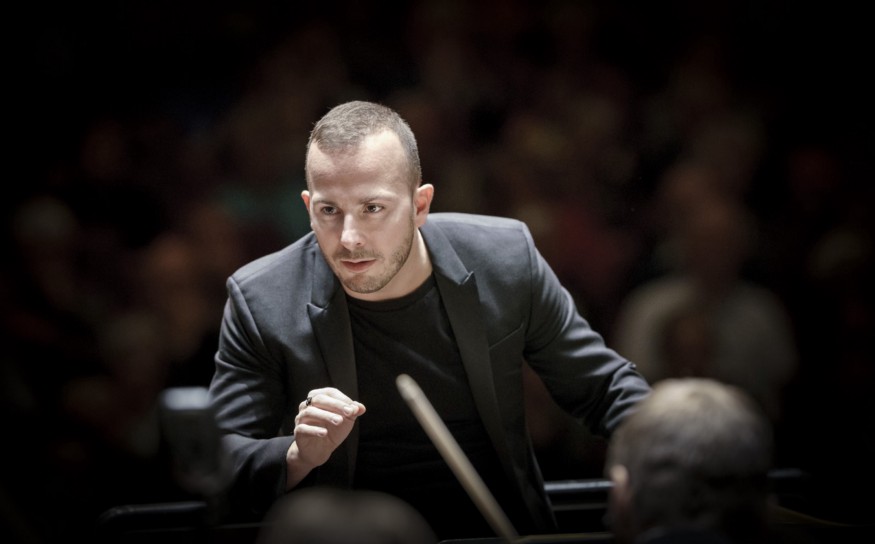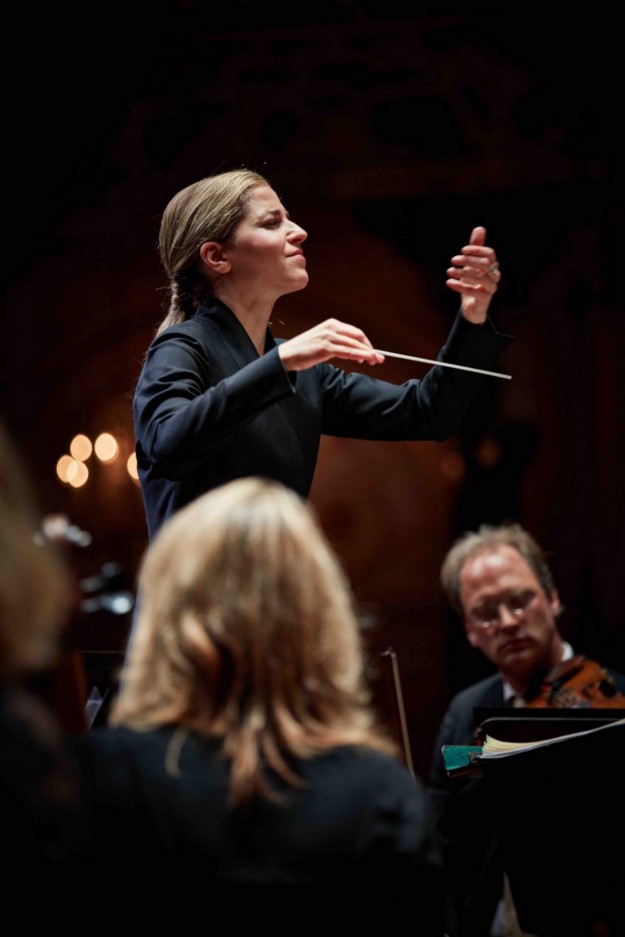“Lead and let go” to transform the potential of your team.
Leadership is about being the fuel and the fire — creating a spark and lighting your team into motion. It’s about infusing and communicating purpose — so that it is what compels your team’s greatest passions and interests and brings them together in a common quest. And I learned as a conductor, that sometimes it’s about letting them play and standing back to enjoy the performance.
True leadership is a unique combination of actively leading and inspiring direction while, at other times, being a conduit for your organization’s own will to shine through.
As an orchestra conductor, if I get the balance right, I have the capacity to enable something extraordinary to emerge through talented people who are all committed to the same thing.
True inspiration requires everyone to be engaged, focussed and deeply sensitive to each other. It requires extraordinary mental focus in the moment and a collective belief in the team’s potential for greatness — and all of this needs to be constantly refueled with happiness.
Leadership is about finding this elusive and constantly fluctuating balance between being a creator and an enabler. If you can harness this understanding and ability in yourself and “lead and let go”, you can unleash the full potential of your team to transcend beyond itself.
1. Empower each individual while creating a team.
Assume that every person in your organization is passionate about what they do and that their greatest motivation comes from their own personal joy in performing.
As leaders we need to first engage that individual passion and transform it into energy that is motivated towards the goals of the team.
In an orchestra, the musicians cannot play Beethoven’s 9th Symphony on their own. Their access to this great work is only in being part of a team. It’s an extraordinary experience to be a part of such a team, and the orchestra recognizes this — yet everyone still has a unique voice and role in its performance.
2. Create unity and direction.
Every organization is filled with talented individuals, but it is the aspirations and the ideals of what we are dedicated to that count. A leader needs to communicate and motivate the team constantly towards achieving the greater vision — and to unite everyone’s focus towards one direction.
In an orchestra, transcending, powerful moments only happen when we are absolutely and completely unified and focussed on the same goals.
My job as a leader is to create an environment that consumes itself with the goal of creating greatness and potential through the efforts of one utterly united group.
3. Each individual must flourish or the team can’t flourish.
Every day we are impacted by the ideas and energy of others around us. Sometimes our own talents and capabilities are sparked or squelched in the presence of other people depending on how we engage with them. Any one individual can inspire colleagues to reach higher or create new possibilities through their personal leadership, standards, work ethics and ideas.
As a leader, you must be watchful and make changes — reconfigure or take away anything that is impeding the team’s ability to flourish. Your goal is to remove obstacles and redirect whenever they emerge.
You must be an alchemist that mixes ideas and personalities to create success and inspiration. Create a space for spontaneous intellectual and imaginative connections to engage and spark. Enable an atmosphere for creativity and possibility by curating the right combinations of people and the right situations for them to thrive in.
4. Build a collective ego.
Competition to get into the top orchestras is incredibly fierce. Every individual in a great orchestra is an extraordinary musician — truly a star in the business. In order to have the courage, confidence and boldness to perform at this level they necessarily have egos.
A great leader can transform this drive and passion into a uniting one by building a collective ego that energizes each person’s focus towards the success of the team. Each individual retains their importance in the orchestra, their music is always heard, and yet they are proud to be a member of the Chicago Symphony or the Berlin Philharmonic.

Chicago Symphony Orchestra — Photo credit: Todd Rosenberg
Focus on the power of what your organization brings to the individual and elevate these experiences for each individual. Build morale and connect people to each other through your efforts. Recognize and value the contributions of each individual.
5. Control the flow….and sometimes let it go.
When I conduct, my role is to express a vision for the music that I believe is authentic and compelling. I need to be so consumed and committed to this vision that the orchestra will unite behind it. Only in this way can I convince them to transcend their individual ideas and personalities, and for the moment, unite together under one vision with me.
The orchestra knows that unity can only be achieved when, at a certain level, we all relinquish individuality to the service of the music. However, there are many moments in the music when leadership from the outside is unnecessary, and the best thing a leader can do is to step back out of the stream and listen — let the team guide itself from within. In this case, the energy takes over on its own and the orchestra performs, listens deeply and reacts within itself to a spontaneous sharing of expression.
If you want to empower the individuals within the team, and to create an extraordinary team that transcends itself, try to bring the organization to this potential as often as possible. Try not to micro-manage, because when we do this, we take all of the energy out of the team and focus it back on us.
Flow is important. We all learn in the moment as we flow and interact with whatever we are doing in real time. An orchestra enjoys it most when a conductor keeps the music going, and in rehearsals stops only to create impactful change or to impart critical perspective. Why? Because they are learning from their own experiences, using their own skills to listen, and making their own evaluations about what is happening in the moment.
Motion is a catalyst for our subconscious to join in. It flashes at us while we are immersed in something and surprises us with new insights. This is an important thing for an insightful leader to think about. Imagine how many times creative new ideas have come in the flow of an interaction, a spinning off of one idea into the thoughts and minds of others?

Yannick Nézet-Séguin: Music Director Philadephia Orchestra — Photo Credit: CREDIT : Hans van der Woerd
6. Awareness creates unity.
When we create awareness in something, it literally grows in our minds.
With its power you suddenly see or hear something you didn’t notice before. You become consumed with a detail that has opened up in your mind.
A conductor’s most important tool is awareness. With its guidance we mould focus on sound, details, relationships, and connections. Our ears open up as each new awareness draws our attention.
Out of awareness comes unity because we learn to notice each other and what each of us is expressing. We notice previously imperceptible details, nuances, reactions and deepen our communication with others. Creativity comes out of awareness and space. When we’re unified — noise gives way to simplicity — music (or whatever we’re doing) becomes pure and clear.
7. Whatever you are…they are.
As a conductor, I want to empower an orchestra to be open and to share with each other so that they can reach their highest potentials in shared performances.
Leaders build pride, identity and recognition. When we treat people with respect and support, this creates the environment where people will behave similarly. Be a good example.
If you are passionate, your team will live up to that passion. If you are hard-working, they will be as well. If you are creative and take risks, you set the expectation and the allowance for others to do the same. If you are patient and kind, your team will not only appreciate it, but will treat others with patience and dignity.
A conductor shows everyone who they are openly — out on a podium in front of an entire orchestra and audience. There is no place to hide when we miss a cue or a beat. If we’re smart we learn to acknowledge our mistakes. We lead by example — so when we make mistakes and acknowledge them, this shows others that they can make mistakes too and that we will all own them.
8. Trust.
The moment that I get on the podium, I want the orchestra to “follow me” in every sense of the word. I want them to give in to my interpretation and trust in my vision. In order for them to trust this vision, they need to respect what I bring to the podium.
Part of this trust is in how I relate to them. If they know that I am focussed on the music, and not on myself, then they trust my intentions. If I trust them to be extraordinary, they will be. They need to be competent. I do too.
Ayn Rand wrote about being a “second-hander” in her famous 1943 book Fountainhead. In her book, Peter Keating is a successful architect who has built his success upon knowing the right people, saying the right things, and conforming to the standards and ideas of others’ work without having true convictions of his own. He doesn’t have the authenticity in his own competence to trust himself. He’s a “second-hander” because he borrows others’ ideas and makes them his own.
As a conductor, I stand on a podium in front of extraordinary people, and am responsible for creating something that has integrity and inspiration. It can only be inspired if it comes out of my own deep, worked for, wrestled with, thoughtful, passionate vision for the interpretation.
An organization always knows whether you are authentic and have the goods. They know if you’ve done your work and have creative ideas that come from within your own imagination. They know.
As a leader I need to work hard every day. When I have just conducted a concert, and the feeling of the euphoria and success is still exploding in my mind — the next morning I am back on the podium with the same orchestra and new repertoire — and whatever I “was” last night goes away, and whatever I am “right now” is what matters. The same applies to the orchestra. We were on the top of the mountain. And now we are at the bottom once again — looking up.
9. Uncover the art.
Michelangelo once said that inside every block of marble dwells a beautiful statue. The artist’s job is to reveal what’s hidden inside the rock.
Every great leader needs to guide and inspire their team to seek and find the statue inside their organization. Be imaginative and share your imagination with others. Your best work as a leader is to enable the space and possibility for this artistry.

Karina Kanellakis — Credit: Eduardus Lee
An orchestra has to uncover the “art” inside the music. It’s there on the page, it’s there in potential, but it is actually difficult to uncover every time we play. An orchestra can become tired, and they can sometimes perform the same music often. Each time, they need to find a new connection, a new feeling and a fresh perspective that inspires them.
As leaders we need to consistently reignite the passion that brought people into our business in the first place. We need to grow and discover, seek new perspectives that spark inspiring connections and understandings. We need to reimagine every day and infuse our organizations with our imaginations.
10. There will be tough times.
Looking back on my own leadership career, the most challenging and stressful moments were the ones that caused me to be a better leader. These were the moments that defined me as an effective leader, or in their lessons, helped me to change and be a better leader for the future.
When we are forced to go through difficult situations, we learn about ourselves, and we become intense in our questions about how to find solutions. Difficulties compel us to grow and to better ourselves, to contemplate and dig deep, to have the courage to make changes. Failures teach us as much, or maybe more, than success does. And when we struggle with failure ourselves, we gain the wisdom that helps us to help others.
We gain empathy, wisdom and courage from struggling and surviving the struggle. This makes us human.
Love what you do, and share this with everyone. Strive for the ideals that you believe in, and your leadership will fall into place. Work hard and be authentic and “they” will follow you. And you in turn will follow them too.

0 Comments